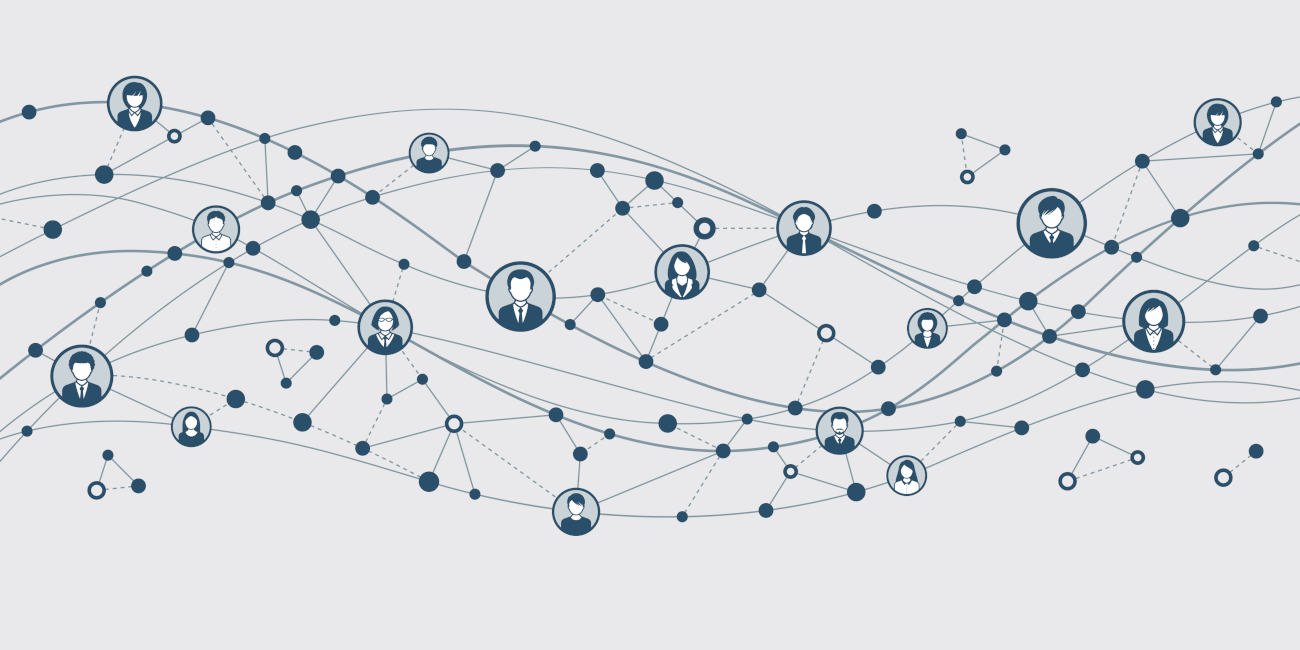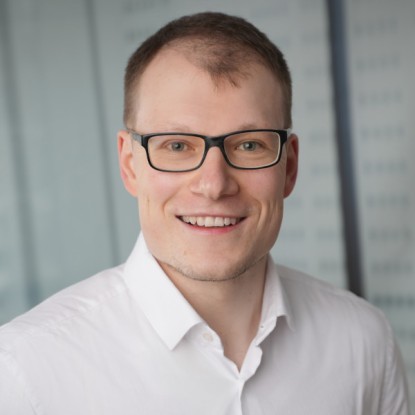Dr.-Ing. Bernd Simon
Kontakt
b.simon@nt.tu-...
work +49 6151 16-22383
fax +49 6151 16-22382
Work
S3|10 317
Landgraf-Georg-Str. 4
64283
Darmstadt
Google Scholar
ORCID
- Ressourcenmanagement in drahtlosen Netzwerken
- Berücksichtigung der Perspektiven mehrerer Stakeholder wie beispielsweise der Infrastruktur- und Serviceanbieter und der Nutzenden der Services oder Technologien
- Erfassung und Berücksichtigung der Präferenzen der Teilnehmer des drahtlosen Netzwerkes
- Mathematische Methoden zur Optimierung von Ressourcen (Kommunikation, Sensing, Rechenleistung und Caching) in großen Netzwerken von autonomen Knoten
- Anwendung von kooperativer Spieltheorie wie beispielsweise Matching und Assignment Spielen
- Kombination von online machine learning, wie bspw. Multi-Armed Bandits, und kooperativer Spieltheorie zur dezentralen Lösung von Optimierungsproblemen
Dissertation
- B. Simon, „A Techno-Economic Multi-Stakeholder Perspective On Wireless Networks: Game Theory and Online Learning Approaches“, Technical University Darmstadt, 2025
https://doi.org/10.26083/tuda-7556 (wird in neuem Tab geöffnet)
Zeitschriftenbeiträge
- B. Simon, P. Adrian, P. Weber, P. Felka, O. Hinz, A. Klein, „A Bargaining Approach for Service Placement in Multi-Access Edge Computing with Information Asymmetries“, IEEE Transactions on Mobile Computing, vol. 26, no. 6, pp. 5464-5481, Jun. 2025
https://doi.org/10.1109/TMC.2025.3533045 (wird in neuem Tab geöffnet) - B. Simon, A. Ortiz, W. Saad, A. Klein, „Decentralized Online Learning in Task Assignment Games for Mobile Crowdsensing“, IEEE Transactions on Communications, vol. 72, no. 8, pp. 4945-4960, Aug. 2024
https://doi.org/10.48550/arXiv.2309.10594 (wird in neuem Tab geöffnet) - A. Sterz, R. Klose, M. Sommer, J. Höchst, J. Link, B. Simon, A. Klein, M. Hollick, B. Freisleben, „Energy-Efficient Decentralized Broadcasting in Wireless Multi-Hop Networks“, Sensors 23,
https://doi.org/10.3390/s23177419 (wird in neuem Tab geöffnet) - B. Simon, K. Keller, A. Sterz, B. Freisleben, O. Hinz, A. Klein, „A Multi-Stakeholder Modeling Framework for the Techno-Economic Analysis of Telecommunication Networks“, IEEE Communications Magazine, Feature Topic: Techno-Economic Analysis of Telecommunication Systems, Februar 2023,
https://doi.org/10.1109/MCOM.001.2200318 (wird in neuem Tab geöffnet) - A. Sterz, P. Felka, B. Simon, S. Klos, A. Klein, O. Hinz and B. Freisleben, „Multi-Stakeholder Service Placement via Iterative Bargaining with Incomplete Information“, IEEE ACM Transactions on Networking, vol. 30, no. 4, pp. 1822-1837, Aug. 2022,
https://doi.org/10.1109/TNET.2022.3157040 (wird in neuem Tab geöffnet)
Konferenzbeiträge
- B. Simon, L. Wahl, A. Klein, „A Socio-Technical Approach to Capacity Maximization for Device-to-Device Relay Selection“, Proc. of IEEE International Conference on Communications (ICC), Montreal, Kanada, pp. 4671-4676 , Jun. 2025,
https://doi.org/10.1109/ICC52391.2025.11161752 (wird in neuem Tab geöffnet) - S. Dongare, B. Simon, A. Ortiz, A. Klein, „Two-Sided Learning: A Techno-Economic View of Mobile Crowdsensing under Incomplete Information“ in Proc. of IEEE International Conference on Communications (ICC), Denver, Colorado, Jun. 2024
https://doi.org/10.1109/ICC51166.2024.10623047 (wird in neuem Tab geöffnet) - A. Sterz, R. Klose, M. Sommer, J. Höchst, J. Link, B. Simon, A. Klein, M. Hollick, Bernd Freisleben „Energy-Efficient Broadcast Trees for Decentralized Data Dissemination in Wireless Networks“, In 48th IEEE Conference on Local Computer Networks (LCN) 2023
https://doi.org/10.1109/LCN58197.2023.10223400 (wird in neuem Tab geöffnet) - M. Chehimi, B. Simon, W. Saad, A. Klein, D. Towsley, M. Debbah „Matching Game for Optimized Association in Quantum Communication Networks“, IEEE Global Communications Conference (GLOBECOM) Dez. 2023, Kuala Lumpur, Malaysia,
https://doi.org/10.48550/arXiv.2305.12682 (wird in neuem Tab geöffnet) - B. Simon, H. Mehler, A. Klein „Online Learning in Matching Games for Task Offloading in Multi-Access Edge Computing“, In IEEE International Conference on Communications (ICC), Rome, Italy, Mai, 2023.
https://doi.org/10.1109/ICC45041.2023.10279031 (wird in neuem Tab geöffnet) - B. Simon, S. Dongare, T. Mahn, A. Ortiz and A. Klein, „Delay- and Incentive-Aware Crowdsensing: A Stable Matching Approach for Coverage Maximization“, In IEEE International Conference on Communications (ICC), Seoul, South Korea, Mai, 2022,
https://doi.org/10.1109/ICC45855.2022.9838603 (wird in neuem Tab geöffnet) - B. Simon, M. Destan, A. Klein, „Reliable Two-Timescale Scheduling in a Multi-User Downlink Channel with Hard Deadlines“ in IEEE Global Communications Conference (GLOBECOM), Madrid, Spain, Dec. 2021,
https://doi.org/10.1109/GLOBECOM46510.2021.9685408 (wird in neuem Tab geöffnet) - O. Opalko, B. Simon, D. Alonso, K. Dostert, „Physical layer and multi-carrier analysis for power line communication networks in Li-ion batteries for electric and hybrid vehicles“ in Proc. of IEEE Vehicular Networking Conference (VNC), Dec. 2015,
https://doi.org/10.1109/VNC.2015.7385583 (wird in neuem Tab geöffnet)
Auf Anfrage interessante Themen im Bereich drahtloser Netzwerke möglich. Bitte schicken Sie mir Ihren Lebenslauf per E-Mail, wenn Sie interessiert sind.
- Der Sonderforschungsbereich (SFB) 1053 „MAKI – Multi-Mechanismen-Adaption für das künftige Internet“ ist ein von der DFG gefördertes Projekt um neue Mechanismen für zukünftige Kommunikationssysteme zu entwickeln. Das Ziel von MAKI liegt in der Erforschung neuer Konstruktionsmethoden, neuer Modelle und Verfahren für die Kommunikationssysteme der Zukunft. Diese sollen Transitionen zwischen funktional ähnlichen Mechanismen innerhalb eines Kommunikationssystems ermöglichen – und zwar automatisiert, koordiniert und schichtenübergreifend.
- Mitarbeit im Teilprojekt B3 „Adaptionsökonomie“ von Juni 2019 bis 2023.
- Gewählter Sprecher der wissenschaftlichen Mitarbeiter von September 2022 bis September 2023.
(BA: Bachelorarbeit, MA: Masterarbeit)
- MA: „Energy-Aware Profit Maximization for Service Placement in Multi-Access Edge Computing“, 2025
- MA: „Energy-Efficient Task Assignment for Mobile Crowdsensing with Competing Users“, 2022
- MA: „Service Placement for Multi-Access Edge Computing incorporating Multiple Service Providers with Incomplete Information“, 2022
- BA: „Online Learning of Stable User-Resource Matching in Multi-Access Edge Computing“, 2022
- BA: „Cost- and Context-Aware Service Placement in Multi-Access Edge Computing“, 2021
- MA: „Revenue- and Energy-Aware Matching for Multi-Access Edge Computing with Computational Demand Forecasting“, 2021
- MA: „Matching-Based Resource Allocation for Ultra-Reliable Communication and Computation in Wireless Networks“, 2021
- MA: „Incentive Mechanisms for Content Delivery Over Unlicensed Bands Incorporating Multiple Stakeholders“, 2021
- BA: „Risk-sensitive Reinforcement Learning for Multi-Channel Allocation in URLLC“, 2020
- MA: „Model Checking Methods for Scheduling in Ultra Reliable Low Latency Communications“, 2020
- SoSe25: Fundamentals of Reinforcement Learning -- Übung
- SoSe24: Fundamentals of Reinforcement Learning -- Übung
- WS22/23: Kommunikationstechnik 1 -- Übung
- WS21/22: Kommunikationstechnik 1 -- Übung
- WS20/21: Communication Technology II -- Übung
- WS19/20: Communication Technology II -- Übung
Praxiserfahrung
- Seit 05/2019: Wissenschaftlicher Mitarbeiter in der Arbeitsgruppe Kommunikationstechnik an der TU Darmstadt.
- 1/2018 – 04/2019: Werkstudent in der Abteilung Sichtprüfsysteme der Fraunhofer IOSB GmbH.
- 04/2017 – 10/2017: Software Engineering Praktikant bei der Endress+Hauser Conducta GmbH.
Bildungsweg
- 03/2023 – 06/2023: Forschungsaufenthalt an der Virginia Tech in der Forschungsgruppe NEWS@VT von Prof. Walid Saad
- Seit 05/2019: Doktorand in der Arbeitsgruppe Kommunikationstechnik an der TU Darmstadt.
- 10/2015 – 12/2018: Master of Science in Elektrotechnik und Informationstechnik am Karlsruher Institut für Technologie.
- 10/2012 – 09/2015: Bachelor of Science in Elektrotechnik und Informationstechnik am Karlsruher Institut für Technologie.


